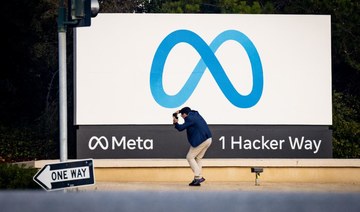NEW YORK: Twitter made money for the first time in its nearly 12-year history, a milestone that satisfied investors in the short term but might not resolve the company’s broader problems any time soon.
The company is still struggling to get people to sign up, despite the attention President Donald Trump’s no-holds barred tweets have drawn to the service. One problem: Anyone can read tweets without signing up. As a result, Twitter’s user base pales compared with Facebook and the Facebook-owned Instagram.
And that means fewer advertising opportunities.
Beyond that, Twitter has been dealing with policing hate speech and abusive comments, fake accounts and attempts by Russian agents to spread misinformation. Every time Twitter tries to respond to a problem, it’s either not good enough, or some other problem emerges.
“They are playing whack-a-mole with these problems,” said Michael Connor, whose Open Mic group helps investors push tech companies to address privacy, abuse and other issues. “They say they have the problem under control, but they don’t know what the problem is exactly.”
Add to that a revolving door of executives, including an influential chief operating officer leaving after Thursday’s earnings report.
Twitter said it had an average of 330 million monthly active users in the final three months of last year, unchanged from the previous quarter and below Wall Street’s estimate of 333 million. By contrast, Facebook has 2.2 billion and Instagram has more than 800 million.
Twitter hadn’t turned a profit until now because — competing with Facebook, Google and others for digital ad dollars — it didn’t attract enough advertising revenue to make up for its expenses. But it’s been cutting costs and focusing on new revenue streams, such as live video.
In some good news, the company grew revenue by 2 percent to $732 million in the final three months of 2017. That’s above the $687 million that analysts polled by FactSet were expecting. Its net income — a first — was $91 million, or 12 cents per share. Adjusted earnings were 19 cents, above analysts’ expectations of 14 cents.
After the results came out, the company’s stock jumped more than 17 percent in morning trading to $31.64, its highest level since 2015.
The quarter “was a breath of fresh air for investors that have patiently awaited for this turnaround story to manifest after years of pain,” said Daniel Ives, head of technology research at GBH Insights.
Nonetheless, Twitter has big challenges ahead. Connor said that while investors don’t want to micromanage Twitter, they at least want the company “to show that there is a level of management and governance on the senior level in place willing to address these issues.”
While Twitter is well-known, it remains difficult to use, making it difficult for the company to explain to people why they need it. Twitter also has an “image problem,” Wedbush analyst Michael Pachter said in a recent research note, “as it has been slow to act on harassment and other hostile behavior.”
The company has enacted a slew of new policies, and Pachter says this renewed focus should help. But enforcing them will be a bigger hurdle .
Connor’s group recently helped two large Twitter and Facebook shareholders file resolutions asking the companies to take more responsibility for fake news, abuse and hate speech. The companies have not formally responded, though Twitter has introduced a slew of new measures to weed out abusive account and has said that it “cares deeply” about misinformation and its harmful effect on civic discourse.
Then there’s the issue of automated accounts made to look like real people. In the days after a New York Times report on the “shadowy global marketplace” of brands and celebrities buying fake retweets and followers, prominent Twitter users collectively lost more than a million followers, suggesting that Twitter either didn’t know or didn’t act until the expose.
Fake accounts aren’t a new problem. Last June, Twitter said it has been “doubling down” on its efforts to weed out such accounts by “expanding our team and resources, and building new tools and processes.” It estimates that less than 5 percent of monthly active users are fake. But the Times referenced a report saying it could be as high as 15 percent.
One chief problem: more fake accounts keep popping up, and those behind them are getting smarter, so Twitter’s countermeasures haven’t made much of a dent.
Forrester Research analyst Erna Alfred Liousas said that while rival social networks such as Facebook deal with fake accounts, too, it may be “more elevated for Twitter” because there has been so much focus on its monthly user numbers. Anything that could jeopardize advertisers’ ability to see how many people they will reach, she said, “is going to cause concern.”
Another concern: last month Chief Operating Officer Anthony Noto announced his resignation from the company following Thursday’s earnings report. Noto, who was also finance chief until last July, has served an influential and important role at the company and had led its venture into live video. Twitter said it is not replacing Noto, and instead will split his duties between executives.
“Now (that) he’s gone, who’s running the company?” Pachter said.
Technically, that’s CEO Jack Dorsey. But Dorsey splits his time as head of payments company Square.
Twitter has “less than Jack’s undivided attention,” Pachter said, adding that nonetheless Dorsey runs the company with a “benevolent autocracy” that leaves little room for innovation.
By contrast, Pachter said Facebook CEO Mark Zuckerberg “is not afraid if they alter his baby, his invention, to make it better,” even if in the end Zuckerberg may be the final arbiter.
Twitter declined to comment. But Dorsey said at a conference late last year that it’s “not about the amount of time I spend at one thing but how I spend the time and what we’re focused on.”
Twitter makes money for first time ever, but problems remain
Twitter makes money for first time ever, but problems remain

WhatsApp being used to target Palestinians through Israel’s Lavender AI system

- Targets’ selection based on membership to some WhatsApp groups, new report reveals
- Accusation raises questions about app’s privacy and encryption claims
LONDON: WhatsApp is allegedly being used to target Palestinians through Israel’s contentious artificial intelligence system, Lavender, which has been linked to the deaths of Palestinian civilians in Gaza, recent reports have revealed.
Earlier this month, Israeli-Palestinian publication +972 Magazine and Hebrew-language outlet Local Call published a report by journalist Yuval Abraham, exposing the Israeli army’s use of an AI system capable of identifying targets associated with Hamas or Palestinian Islamic Jihad.
This revelation, corroborated by six Israeli intelligence officers involved in the project, has sparked international outrage, as it suggested Lavender has been used by the military to target and eliminate suspected militants, often resulting in civilian casualties.
In a recent blog post, software engineer and activist Paul Biggar highlighted Lavender’s reliance on WhatsApp.
He pointed out how membership in a WhatsApp group containing a suspected militant can influence Lavender’s identification process, highlighting the pivotal role messaging platforms play in supporting AI targeting systems like Lavender.
“A little-discussed detail in the Lavender AI article is that Israel is killing people based on being in the same WhatsApp group as a suspected militant,” Bigger wrote. “There’s a lot wrong with this.”
He explained that users often find themselves in groups with strangers or acquaintances.
A lot of difficult questions for Meta before that trust can be rebuilt, and I don't honestly believe that Meta can or will answer them pic.twitter.com/vaeLbg9hx3
— Paul Biggar (@paulbiggar) April 16, 2024
Biggar also suggested that WhatsApp’s parent company, Meta, may be complicit, whether knowingly or unknowingly, in these operations.
He accused Meta of potentially violating international humanitarian law and its own commitments to human rights, raising questions about the privacy and encryption claims of WhatsApp’s messaging service.
The revelation is just the latest of Meta’s perceived attempts to silence pro-Palestinian voices.
Since before the beginning of the conflict, the Menlo Park giant has faced accusations of double standards favoring Israel.
In February, the Guardian revealed that Meta was considering the expansion of its hate speech policy to the term “Zionist.”
More recently, Meta quietly introduced a new feature on Instagram that automatically limits users’ exposure to what it deems “political” content, a decision criticized by experts as a means of systematically censoring pro-Palestinian content.
Responding to requests for comment, a WhatsApp spokesperson said that the company could not verify the accuracy of the report but assured that “WhatsApp has no backdoors and does not provide bulk information to any government.”
Eastern European mercenaries suspected of attacking Iranian journalist Pouria Zeraati

- UK security services believe criminal proxies with links to Tehran carried out London knife attack
LONDON: Police said on Friday that a group of Eastern European mercenaries is suspected to have carried out the knife attack on Iranian journalist Pouria Zeraati in late March.
Zeraati was stabbed repeatedly by three men in an attack outside his south London home.
The Iran International presenter lost a significant amount of blood and was hospitalized for several days. He has since returned to work, but is now living in a secure location.
Iran International and its staff have faced repeated threats, believed to be linked to the Iranian regime, which designated the broadcaster as a terrorist organization for its coverage of the 2022 protests.
Iran’s charge d’affaires, Seyed Mehdi Hosseini Matin, denied any government involvement in the attack on Zeraati.
Investigators revealed that the suspects fled the UK immediately after the incident, with reports suggesting they traveled to Heathrow Airport before boarding commercial flights to different destinations.
Police are pursuing leads in Albania as part of their investigation.
Counterterrorism units and Britain’s security services leading the inquiry believe that the attack is another instance of the Iranian regime employing criminal proxies to target its critics on foreign soil.
This method allows Tehran to maintain plausible deniability and avoids raising suspicions when suspects enter the country.
Zeraati was attacked on March 29 as he left his home home to travel to work. His weekly show serves as a source of impartial and uncensored news for many Iranians at home and abroad.
In an interview with BBC Radio 4’s “Today” program this week, Zeraati said that while he is physically “much better,” mental recovery from the assault “will take time.”
Court orders release of prominent Palestinian professor suspected of incitement

- Nadera Shalhoub-Kevorkian was under investigation after questioning Hamas atrocities, criticizing Israel
- Insufficient justification for arrest, says court
- Detention part of a broader campaign, says lawyer
LONDON: The prominent Hebrew University of Jerusalem professor, Nadera Shalhoub-Kevorkian, was released on Friday after a court order rejected police findings.
The criminologist and law professor was arrested the previous day on suspicion of incitement. She had been under investigation for remarks regarding the Oct. 7 attacks by Hamas and for saying Israelis were committing “genocidal crimes” in the Gaza Strip and should fear the consequences.
On Friday, the court dismissed a police request to extend her remand, citing insufficient justification for the arrest, according to Hebrew media reports.
Protesters gathered outside the courthouse to demonstrate against Shalhoub-Kevorkian’s arrest.
Israeli Channel 12, which first reported the news, did not specify where Shalhoub was arrested but her lawyer later confirmed she was apprehended at her home in the Armenian Quarter of Jerusalem.
“She’s not been in good health recently and was arrested in her home,” Alaa Mahajna said. “Police searched the house and seized her computer and cellphone, [Palestinian] poetry books and work-related papers.”
Mahajna described Shalhoub-Kevorkian’s arrest as part of a broader campaign against her, which has included numerous threats to her life and of violence.
The professor was suspended by her university last month after calling for the abolition of Zionism and suggesting that accounts of sexual assault during the Hamas-led attacks on Israel were fabricated.
The suspension was initially criticized by the university community as a blow to academic freedom in Israel. However, the decision was later reversed following an apology from Shalhoub-Kevorkian and an admission that sexual assaults took place.
Since hostilities began last year, numerous dissenting voices in Israel have faced arrest for expressing solidarity with victims of the bombardment in Gaza.
In October, well-known ultra-Orthodox Israeli journalist Israel Frey was forced into hiding following a violent attack on his home.
Bayan Khateeb, a student at the Technion-Israel Institute of Technology, was arrested last year for incitement after posting an Instagram story showing the preparation of a popular spicy egg dish with the caption: “We will soon be eating the victory shakshuka.”
Sony, Apollo discuss joint bid for Paramount, says source

- Paramount is already in an exclusive deal with Skydance Media over possible merger
LONDON: Sony Pictures Entertainment and Apollo Global Management are discussing making a joint bid for Paramount Global, according to a person familiar with the matter.
The companies have yet to approach Paramount, which is in exclusive deal talks with Skydance Media, an independent studio led by David Ellison, though some investors have urged Paramount to explore other options.
The competing bid, which is still being structured, would offer cash for all outstanding Paramount shares and take the company private, the source said.
Sony would hold a majority stake in the joint venture and operate the media company, and its library of films, including such classics as “Star Trek,” “Mission:Impossible” and “Indiana Jones,” and television characters like SpongeBob SquarePants, according to the source.
Sony Pictures Entertainment Chairman Tony Vinciquerra, a veteran media executive with deep experience in film and television, would likely run the studio and take advantage of Sony’s marketing and distribution.
Apollo would likely assume control of the CBS broadcast network and its local television stations, because of restrictions on foreign ownership of broadcast stations, the source said. Sony’s parent corporation is headquartered in Tokyo.
The New York Times first reported the Sony-Apollo discussions. Paramount and Sony declined comment. Apollo could not be reached for comment.
The private equity firm previously made a $26 billion offer to buy Paramount Global, whose enterprise value at the end of 2023 was about $22.5 billion.
A special committee of Paramount’s board elected to continue with its advanced deal talks with Skydance, rather than chase a deal “that might not actually come to fruition,” said two people with knowledge of the board’s action.
The board committee is evaluating the possible acquisition of the smaller independent studio in a stock deal worth $4 billion to $5 billion.
Skydance is negotiating separately to acquire National Amusements, a company that holds the Redstone family’s controlling interest in Paramount, according to a person familiar with the deal terms. That transaction is contingent upon a Skydance-Paramount merger.
Meta releases beefed-up AI models, eyes integration into its apps

- AI model Llama 3 takes step towards human-level intelligence, Meta claims
- Company also announced new AI Assistant integration into its major social media apps
SAN FRANCISCO: Meta on Thursday introduced an improved AI assistant built on new versions of its open-source Llama large language model.
Meta AI is smarter and faster due to advances in the publicly available Llama 3, the tech titan said in a blog post.
“The bottom line is we believe Meta AI is now the most intelligent AI assistant that you can freely use,” Meta co-founder and chief executive Mark Zuckerberg said in a video on Instagram.
Being open source means that developers outside of Meta are free to customize Llama 3 as they wish and the company may then incorporate those improvements and insights in an updated version.
“We’re excited about the potential that generative AI technology can have for people who use Meta products and for the broader ecosystem,” Meta said.
“We also want to make sure we’re developing and releasing this technology in a way that anticipates and works to reduce risk.”
That effort includes incorporating protections in the way Meta designs and releases Llama models and being cautious when it adds generative AI features to Facebook, Instagram, WhatsApp, and Messenger, according to Meta.
“We’re also making Meta AI much easier to use across our apps. We built it into the search box right at the top of WhatsApp, Facebook, and Instagram messenger, so any time you have a question, you can just ask it right there,” said Zuckerberg in the video.
AI models, Meta’s included, have been known to occasionally go off the rails, giving inaccurate or bizarre responses in episodes referred to as “hallucinations.”
Examples shared on social media included Meta AI claiming to have a child in the New York City school system during an online forum conversation.
Meta AI has been consistently updated and improved since its initial release last year, according to the company.
“Meta’s slower approach to building its AI has put the company behind in terms of consumer awareness and usage, but it still has time to catch up,” said Sonata Insights chief analyst Debra Aho Williamson.
“Its social media apps represent a massive user base that it can use to test AI experiences.”
By weaving AI into its family of apps, Meta will quickly get features powered by the technology to billions of people and benefit from seeing what users do with it.
Meta cited the example of refining the way its AI answers prompts regarding political or social issues to summarize relevant points about the topic instead of offering a single point of view.
Llama 3 has been tuned to better discern whether prompts are innocuous or out-of-bounds, according to Meta.
“Large language models tend to overgeneralize, and we don’t intend for it to refuse to answer prompts like ‘How do I kill a computer program?’ even though we don’t want it to respond to prompts like ‘How do I kill my neighbor?’,” Meta explained.
Meta said it lets users know when they are interacting with AI on its platform and puts visible markers on photorealistic images that were in fact generated by AI.
Beginning in May, Meta will start labeling video, audio, and images “Made with AI” when it detects or is told content is generated by the technology.
Llama 3, for now, is based in English but in the coming months Meta will release more capable models able to converse in multiple languages, the company said.



















